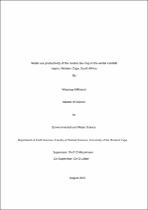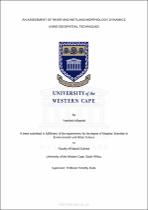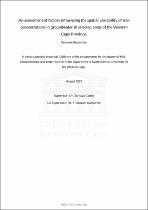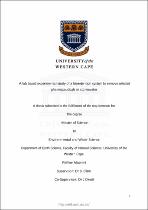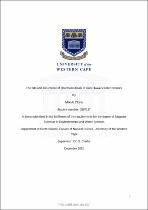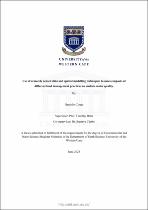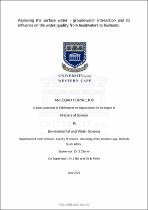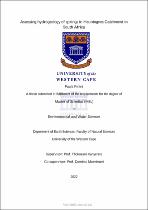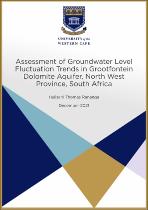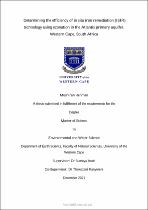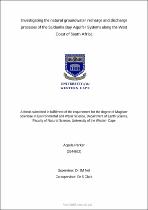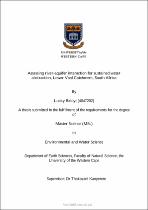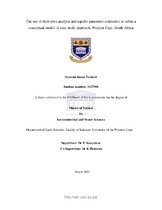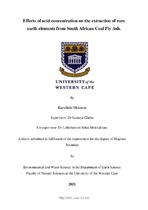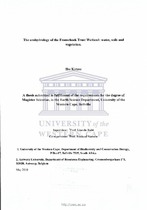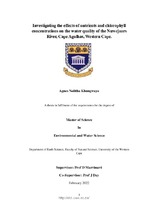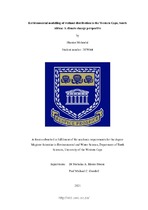Magister Scientiae - MSc (Environ & Water Science)
Browse by
Recent Submissions
-
Water use productivity of the rooibos tea crop in the winter rainfall region, Western Cape, South Africa
(University of the Western Cape, 2023)Aspalathus linearis, commonly known as rooibos or red tea, is one of the well-known herbal tea beverages in South Africa. A. linearis is known for its medicinal, economic, traditional and ecological values. This leguminous ... -
An assessment of river and wetland morphology dynamics using geospatial techniques
(University of the Western Cape, 2023)Land surface modification has intensified in recent years, and it continues to be an ongoing process. This raises serious concerns about changes in land use and land cover (LULC) since some of these changes have led to ... -
An assessment of factors influencing the spatial variability of iron concentrations in groundwater in selected areas of the Western Cape Province.
(University of the Western Cape, 2023)Groundwater in South Africa, and more specifically the Western Cape Province (WCP), has become of major interest in recent years due to the unpredictable climatic conditions and the uncertainty of surface water to continuously ... -
A lab based experimental study of a bioretention system to remove selected pharmaceuticals in stormwater
(University of the Western Cape, 2023)The use of treated stormwater as an alternative source of water supply in urban areas is receiving global recognition. This approach is being supported as an innovative initiative that improves urban water security and ... -
The fate and occurrence of pharmaceuticals in Cape Town’s water network
(University of the Western Cape, 2022)Thousands of pharmaceuticals, pesticides and microplastics are consumed and disposed of directly or indirectly into various water bodies globally. Which are collectively termed “contaminants of emerging concern” or CECs. ... -
Use of remotely sensed data and spatial modelling techniques to assess impacts of different land management practices on surface water quality
(University of the Western Cape, 2023)The study uses remote sensing and statistical techniques in assessing land use land cover impacts on surface water quality in the Heuningnes Catchment, Cape Agulhas, South Africa. Firstly, a review of the advancements made ... -
Assessing the surface water - groundwater interaction and its influence on the water quality from headwaters to lowlands
(University of the Western Cape, 2023)The connections between surface water and groundwater systems remain poorly understood in many catchments throughout the world and yet they are fundamental in effectively managing water resources. Managing water resources ... -
The presence and concentration of antiretroviral drugs in different water bodies around the Western Cape
(University of the Western Cape, 2023)Concerns regarding the prevalence of chemicals from medicines and personal care goods, such as cosmetics, in streams and rivers have grown in recent years. Water quality experts and environmentalists are becoming increasingly ... -
Assessing hydrogeology of springs in Heuningnes Catchment in South Africa
(University of the Western Cape, 2022)Springs have been a significant source of water for flora and fauna since the beginning of human history and, in some circumstances, the only source capable of supplying enough water to sustain domestic and agricultural ... -
Assessment of groundwater level fluctuation trends in Grootfontein dolomite Aquifer, North West Province, South Africa
(University of the Western Cape, 2022)Groundwater level decline is a problem experienced in aquifers with more than one groundwater user such as the Grootfontein dolomite aquifer in the North West Province of South Africa. This study assessed groundwater ... -
Assessing effectiveness of groundwater remediation technologies to a coastal aquifer within an urban environment in South Africa
(University of the Western Cape, 2022)The study aimed to assess the effectiveness of Reverse Osmosis technology as an example of ex-situ groundwater remediation technologies. The Cape Flats Aquifer System, an urban coastal system, was used as a case study. ... -
Determining the efficiency of in situ iron remediation (ISIR) technology using ozonation in the Atlantis primary aquifer, Western Cape, South Africa
(University of the Western Cape, 2022)In situ iron remediation (ISIR) applications has become a popular technique for reducing iron and manganese concentrations in boreholes that impose aesthetic and potable issues to groundwater quality and water supply ... -
Investigating the natural groundwater recharge and discharge processes of the Saldanha Bay aquifer systems along the West Coast of South Africa
(University of the Western Cape, 2022)Saldanha Bay Local Municipality is partially dependent on groundwater as part of its bulk water supply as surface water resources in the area are extremely limited and fully allocated. Due to this, there is lots of ... -
Assessing river-aquifer interaction for sustained water abstraction, Lower Vaal Catchment, South Africa
(University of the Western Cape, 2022)Several methods are available in the literature for the estimations of river-aquifer interactions. However, the selection of which depends on available data, local geographic and topographic conditions, the spatial and ... -
The use of derivative analysis and aquifer parameter estimation to refine a conceptual model: A case study approach, Western Cape, South Africa
(University of Western Cape, 2021)Hydrogeological characterization of an aquifer system is a first step to determine groundwater quantity, yield potential, socio-economic value, storage capacity and aquifer transmissivity properties of an aquifer as a water ... -
Effects of acid concentration on the extraction of rare earth elements from South African Coal Fly Ash
(University of Western Cape, 2021)Coal is seen as a reliable and secure energy source in many countries around the world despite the development of a number of alternative sources of energy. A rise in global energy demand has led to an increase in coal ... -
The ecohydrology of the Fransehoek Trust Wetland: water, soils and vegetation.
(University of the Western Cape, 2010)The research was driven by a need to increase the knowledge base concerning wetland ecological responses, as well as to identify and evaluate the factors driving the functioning of the Franschhoek Trust Wetland. An ... -
Investigating the effects of nutrients and chlorophyll concentrations on the water quality of the Nuwejaars River, Cape Agulhas, Western Cape
(University of Western Cape, 2021)The Nuwejaars River flows into the largest natural freshwater lake in South Africa, Soetendalsvlei, which relies on and interacts with the Nuwejaars River. Therefore, the water quality of the Nuwejaars River plays a role ... -
Environmental modelling of wetland distribution in the Western Cape, South Africa: A climate change perspective
(University of Western Cape, 2021)Wetlands have been recognised as one of the most intrinsically valuable and threatened ecosystems in the world. Global estimates indicate that wetlands are being lost or transformed at a rapid rate, exacerbated by projected ... -
Understanding spatial patterns of dispersal and deposition of fine sediment and adsorbed phosphates in the Wiesdrift Wetland on the Nuwejaars River, Cape Agulhas
(University of the Western Cape, 2021)River catchments in agricultural areas are strongly influenced by runoff from cultivated or grazed fields, and nutrient loading of these fields can result in large quantities of nitrates and phosphates being transported ...

